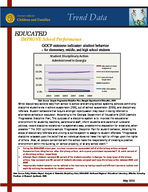Trend Data
EDUCATED
- IMPROVE School Performance
GOCF outcome indicator: student behavior
for elementary, middle, and high school students
Student Disciplinary Action Administered in Georgia
80.0%
60.0%
Alternative School Assignment
In-School Suspension
40.0%
20.0% 0.0%
2004 2005 2006 2007 2008 2009
Out-of-School Suspension Expulsion
Other Disciplinary Action
Data Source: Sample Progressive Discipline Plan, Georgia Department of Education, 2010.
While disciplinary actions vary from school to school and among school systems, schools commonly discipline students via in-school suspension (ISS), out-of-school suspension (OSS), and disciplinary referrals. Student behaviors that require stronger repercussion may result in being referred to alternative schools or expulsion. According to the Georgia Department of Education's (DOE) sample Progressive Discipline Plan, "the purpose of a discipline system is to: improve the educational environment for students, teachers, parents and staff; inform students and parents of rules and policies; record discipline violations in a systematic way; predetermine disposition for violations, when possible." The DOE outlined a sample Progressive Discipline Plan for student behavior, detailing the steps of disciplinary referrals and utilizing a points system to assign to student offenses. "Progressive discipline is based upon the belief that an individual does not have the right to infringe upon the rights of others. Also, all people concerned with the school have the responsibility of creating a positive environment within the building, on school property, or at any school event."
During the 2004-2005 school year, in-school suspension represented half of all disciplinary actions assigned. Suspension from riding the bus, other disciplinary actions, and corporal punishment represented 7, 6, and 4 percent of all disciplinary actions, respectively.
Although Black students represent 38 percent of the student population in Georgia, for many types of disciplinary actions, they represent over 50 percent of students who were assigned each type disciplinary action between 2000 and 2005.
Inappropriate student behavior can be reduced in the classroom by having smooth and efficient classroom routines and explicitly outlining the standards for student behavior.
Data Source: Policy Division Report, Analysis of Statewide Disciplinary Data, 2004-2005. Northwest Regional Educational Laboratory. Effective Schooling Practices: A Research Synthesis, 1984.
May 2010
